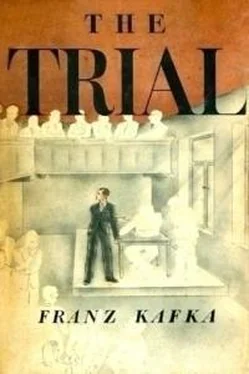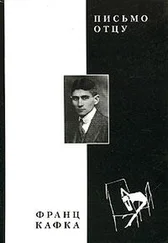Франц Кафка - The Trial
Здесь есть возможность читать онлайн «Франц Кафка - The Trial» — ознакомительный отрывок электронной книги совершенно бесплатно, а после прочтения отрывка купить полную версию. В некоторых случаях можно слушать аудио, скачать через торрент в формате fb2 и присутствует краткое содержание. Год выпуска: 2014, Издательство: epubBooks Classics, Жанр: Классическая проза, на английском языке. Описание произведения, (предисловие) а так же отзывы посетителей доступны на портале библиотеки ЛибКат.
- Название:The Trial
- Автор:
- Издательство:epubBooks Classics
- Жанр:
- Год:2014
- ISBN:нет данных
- Рейтинг книги:3 / 5. Голосов: 1
-
Избранное:Добавить в избранное
- Отзывы:
-
Ваша оценка:
- 60
- 1
- 2
- 3
- 4
- 5
The Trial: краткое содержание, описание и аннотация
Предлагаем к чтению аннотацию, описание, краткое содержание или предисловие (зависит от того, что написал сам автор книги «The Trial»). Если вы не нашли необходимую информацию о книге — напишите в комментариях, мы постараемся отыскать её.
The Trial — читать онлайн ознакомительный отрывок
Ниже представлен текст книги, разбитый по страницам. Система сохранения места последней прочитанной страницы, позволяет с удобством читать онлайн бесплатно книгу «The Trial», без необходимости каждый раз заново искать на чём Вы остановились. Поставьте закладку, и сможете в любой момент перейти на страницу, на которой закончили чтение.
Интервал:
Закладка:
"Well look at you two sat huddled together!" called Leni as she came back with the dish and stood in the doorway. They were indeed sat close together, if either of them turned his head even slightly it would have knocked against the other's, the businessman was not only very small but also sat hunched down, so that K. was also forced to bend down low if he wanted to hear everything. "Not quite yet!" called out K., to turn Leni away, his hand, still resting on the businessman's hand, twitching with impatience. "He wanted me to tell him about my trial," said the businessman to Leni. "Carry on, then, carry on," she said. She spoke to the businessman with affection but, at the same time, with condescension. K. did not like that, he had begun to learn that the man was of some value after all, he had experience at least, and he was willing to share it. Leni was probably wrong about him. He watched her in irritation as Leni now took the candle from the businessman's hand – which he had been holding on to all this time – wiped his hand with her apron and then knelt beside him to scratch off some wax that had dripped from the candle onto his trousers. "You were about to tell me about the petty lawyers," said K., shoving Leni's hand away with no further comment. "What's wrong with you today?" asked Leni, tapped him gently and carried on with what she had been doing. "Yes, the petty lawyers," said the businessman, putting his hand to his brow as if thinking hard. K. wanted to help him and said, "You wanted immediate results and so went to the petty lawyers." "Yes, that's right," said the businessman, but did not continue with what he'd been saying. "Maybe he doesn't want to speak about it in front of Leni," thought K., suppressing his impatience to hear the rest straight away, and stopped trying to press him.
"Have you told him I'm here?" he asked Leni. "Course I have," she said, "he's waiting for you. Leave Block alone now, you can talk to Block later, he'll still be here." K. still hesitated. "You'll still be here?" he asked the businessman, wanting to hear the answer from him and not wanting Leni to speak about the businessman as if he weren't there, he was full of secret resentment towards Leni today. And once more it was only Leni who answered. "He often sleeps here." "He sleeps here?" exclaimed K., he had thought the businessman would just wait there for him while he quickly settled his business with the lawyer, and then they would leave together to discuss everything thoroughly and undisturbed. "Yes," said Leni, "not everyone's like you, Josef, allowed to see the lawyer at any time you like. Do don't even seem surprised that the lawyer, despite being ill, still receives you at eleven o'clock at night. You take it far too much for granted, what your friends do for you. Well, your friends, or at least I do, we like to do things for you. I don't want or need any more thanks than that you're fond of me." "Fond of you?" thought K. at first, and only then it occurred to him, "Well, yes, I am fond of her." Nonetheless, what he said, forgetting all the rest, was, "He receives me because I am his client. If I needed anyone else's help I'd have to beg and show gratitude whenever I do anything." "He's really nasty today, isn't he?" Leni asked the businessman. "Now it's me who's not here," thought K., and nearly lost his temper with the businessman when, with the same rudeness as Leni, he said, "The lawyer also has other reasons to receive him. His case is much more interesting than mine. And it's only in its early stages too, it probably hasn't progressed very far so the lawyer still likes to deal with him. That'll all change later on." "Yeah, yeah," said Leni, looking at the businessman and laughing. "He doesn't half talk!" she said, turning to face K. "You can't believe a word he says. He's as talkative as he is sweet. Maybe that's why the lawyer can't stand him. At least, he only sees him when he's in the right mood. I've already tried hard to change that but it's impossible. Just think, there are times when I tell him Block's here and he doesn't receive him until three days later. And if Block isn't on the spot when he's called then everything's lost and it all has to start all over again. That's why I let Block sleep here, it wouldn't be the first time Dr. Huld has wanted to see him in the night. So now Block is ready for that. Sometimes, when he knows Block is still here, he'll even change his mind about letting him in to see him." K. looked questioningly at the businessman. The latter nodded and, although he had spoken quite openly with K. earlier, seemed to be confused with shame as he said, "Yes, later on you become very dependent on your lawyer." "He's only pretending to mind," said Leni. "He likes to sleep here really, he's often said so." She went over to a little door and shoved it open. "Do you want to see his bedroom?" she asked. K. went over to the low, windowless room and looked in from the doorway. The room contained a narrow bed which filled it completely, so that to get into the bed you would need to climb over the bedpost. At the head of the bed there was a niche in the wall where, fastidiously tidy, stood a candle, a bottle of ink, and a pen with a bundle of papers which were probably to do with the trial. "You sleep in the maid's room?" asked K., as he went back to the businessman. "Leni's let me have it," answered the businessman, "it has many advantages." K. looked long at him; his first impression of the businessman had perhaps not been right; he had experience as his trial had already lasted a long time, but he had paid a heavy price for this experience. K. was suddenly unable to bear the sight of the businessman any longer. "Bring him to bed, then!" he called out to Leni, who seemed to understand him. For himself, he wanted to go to the lawyer and, by dismissing him, free himself from not only the lawyer but also from Leni and the businessman. But before he had reached the door the businessman spoke to him gently. "Excuse me, sir," he said, and K. looked round crossly. "You've forgotten your promise," said the businessman, stretching his hand out to K. imploringly from where he sat. "You were going to tell me a secret." "That is true," said K., as he glanced at Leni, who was watching him carefully, to check on her. "So listen; it's hardly a secret now anyway. I'm going to see the lawyer now to sack him." "He's sacking him!" yelled the businessman, and he jumped up from his chair and ran around the kitchen with his arms in the air. He kept on shouting, "He's sacking his lawyer!" Leni tried to rush at K. but the businessman got in her way so that she shoved him away with her fists. Then, still with her hands balled into fists, she ran after K. who, however, had been given a long start. He was already inside the lawyer's room by the time Leni caught up with him. He had almost closed the door behind himself, but Leni held the door open with her foot, grabbed his arm and tried to pull him back. But he put such pressure on her wrist that, with a sigh, she was forced to release him. She did not dare go into the room straight away, and K. locked the door with the key.
"I've been waiting for you a very long time," said the lawyer from his bed. He had been reading something by the light of a candle but now he laid it onto the bedside table and put his glasses on, looking at K. sharply through them. Instead of apologising K. said, "I'll be leaving again soon." As he had not apologised the lawyer ignored what K. said, and replied, "I won't let you in this late again next time." "I find that quite acceptable," said K. The lawyer looked at him quizzically. "Sit down," he said. "As you wish," said K., drawing a chair up to the bedside table and sitting down. "It seemed to me that you locked the door," said the lawyer. "Yes," said K., "it was because of Leni." He had no intention of letting anyone off lightly. But the lawyer asked him, "Was she being importunate again?" "Importunate?" asked K. "Yes," said the lawyer, laughing as he did so, had a fit of coughing and then, once it had passed, began to laugh again. "I'm sure you must have noticed how importunate she can be sometimes," he said, and patted K.'s hand which K. had rested on the bedside table and which he now snatched back. "You don't attach much importance to it, then," said the lawyer when K. was silent, "so much the better. Otherwise I might have needed to apologise to you. It is a peculiarity of Leni's. I've long since forgiven her for it, and I wouldn't be talking of it now, if you hadn't locked the door just now. Anyway, perhaps I should at least explain this peculiarity of hers to you, but you seem rather disturbed, the way you're looking at me, and so that's why I'll do it, this peculiarity of hers consists in this; Leni finds most of the accused attractive. She attaches herself to each of them, loves each of them, even seems to be loved by each of them; then she sometimes entertains me by telling me about them when I allow her to. I am not so astonished by all of this as you seem to be. If you look at them in the right way the accused really can be attractive, quite often. But that is a remarkable and to some extent scientific phenomenon. Being indicted does not cause any clear, precisely definable change in a person's appearance, of course. But it's not like with other legal matters, most of them remain in their usual way of life and, if they have a good lawyer looking after them, the trial doesn't get in their way. But there are nonetheless those who have experience in these matters who can look at a crowd, however big, and tell you which among them is facing a charge. How can they do that, you will ask. My answer will not please you. It is simply that those who are facing a charge are the most attractive. It cannot be their guilt that makes them attractive as not all of them are guilty – at least that's what I, as a lawyer, have to say – and nor can it be the proper punishment that has made them attractive as not all of them are punished, so it can only be that the proceedings levelled against them take some kind of hold on them. Whatever the reason, some of these attractive people are indeed very attractive. But all of them are attractive, even Block, pitiful worm that he is." As the lawyer finished what he was saying, K. was fully in control of himself, he had even nodded conspicuously at his last few words in order to confirm to himself the view he had already formed; that the lawyer was trying to confuse him, as he always did, by making general and irrelevant observations, and thus distract him from the main question of what he was actually doing for K.'s trial. The lawyer must have noticed that K. was offering him more resistance than before, as he became silent, giving K. the chance to speak himself, and then, as K. also remained silent, he asked, "Did you have a particular reason for coming to see me today?" "Yes," said K., putting his hand up to slightly shade his eyes from the light of the candle so that he could see the lawyer better, "I wanted to tell you that I'm withdrawing my representation from you, with immediate effect." "Do I understand you rightly?" asked the lawyer as he half raised himself in his bed and supported himself with one hand on the pillow. "I think you do," said K., sitting stiffly upright as if waiting in ambush. "Well we can certainly discuss this plan of yours," said the lawyer after a pause. "It's not a plan any more," said K. "That may be," said the lawyer, "but we still mustn't rush anything." He used the word 'we', as if he had no intention of letting K. go free, and as if, even if he could no longer represent him, he could still at least continue as his adviser. "Nothing is being rushed," said K., standing slowly up and going behind his chair, "everything has been well thought out and probably even for too long. The decision is final." "Then allow me to say a few words," said the lawyer, throwing the bed cover to one side and sitting on the edge of the bed. His naked, white– haired legs shivered in the cold. He asked K. to pass him a blanket from the couch. K. passed him the blanket and said, "You are running the risk of catching cold for no reason." "The circumstances are important enough," said the lawyer as he wrapped the bed cover around the top half of his body and then the blanket around his legs. "Your uncle is my friend and in the course of time I've become fond of you as well. I admit that quite openly. There's nothing in that for me to be ashamed of." It was very unwelcome for K. to hear the old man speak in this touching way, as it forced him to explain himself more fully, which he would rather have avoided, and he was aware that it also confused him even though it could never make him reverse his decision. "Thank you for feeling so friendly toward me," he said, "and I also realise how deeply involved you've been in my case, as deeply as possible for yourself and to bring as much advantage as possible to me. Nonetheless, I have recently come to the conviction that it is not enough. I would naturally never attempt, considering that you are so much older and more experienced than I am, to convince you of my opinion; if I have ever unintentionally done so then I beg your forgiveness, but, as you have just said yourself, the circumstances are important enough and it is my belief that my trial needs to be approached with much more vigour than has so far been the case." "I see," said the lawyer, "you've become impatient." "I am not impatient," said K., with some irritation and he stopped paying so much attention to his choice of words. "When I first came here with my uncle you probably noticed I wasn't greatly concerned about my case, and if I wasn't reminded of it by force, as it were, I would forget about it completely. But my uncle insisted I should allow you to represent me and I did so as a favour to him. I could have expected the case to be less of a burden than it had been, as the point of taking on a lawyer is that he should take on some of its weight. But what actually happened was the opposite. Before, the trial was never such a worry for me as it has been since you've been representing me. When I was by myself I never did anything about my case, I was hardly aware of it, but then, once there was someone representing me, everything was set for something to happen, I was always, without cease, waiting for you to do something, getting more and more tense, but you did nothing. I did get some information about the court from you that I probably could not have got anywhere else, but that can't be enough when the trial, supposedly in secret, is getting closer and closer to me." K. had pushed the chair away and stood erect, his hands in the pockets of his frock coat. "After a certain point in the proceedings," said the lawyer quietly and calmly, "nothing new of any importance ever happens. So many litigants, at the same stage in their trials, have stood before me just like you are now and spoken in the same way." "Then these other litigants," said K., "have all been right, just as I am. That does not show that I'm not." "I wasn't trying to show that you were mistaken," said the lawyer, "but I wanted to add that I expected better judgement from you than from the others, especially as I've given you more insight into the workings of the court and my own activities than I normally do. And now I'm forced to accept that, despite everything, you have too little trust in me. You don't make it easy for me." How the lawyer was humiliating himself to K.! He was showing no regard for the dignity of his position, which on this point, must have been at its most sensitive. And why did he do that? He did seem to be very busy as a lawyer as well a rich man, neither the loss of income nor the loss of a client could have been of much importance to him in themselves. He was moreover unwell and should have been thinking of passing work on to others. And despite all that he held on tightly to K. Why? Was it something personal for his uncle's sake, or did he really see K.'s case as one that was exceptional and hoped to be able to distinguish himself with it, either for K.'s sake or – and this possibility could never be excluded – for his friends at the court? It was not possible to learn anything by looking at him, even though K. was scrutinizing him quite brazenly. It could almost be supposed he was deliberately hiding his thoughts as he waited to see what effect his words would have. But he clearly deemed K.'s silence to be favourable for himself and he continued, "You will have noticed the size of my office, but that I don't employ any staff to help me. That used to be quite different, there was a time when several young lawyers were working for me but now I work alone. This is partly to do with changes in the way I do business, in that I concentrate nowadays more and more on matters such as your own case, and partly to do with the ever deeper understanding that I acquire from these legal matters. I found that I could never let anyone else deal with this sort of work unless I wanted to harm both the client and the job I had taken on. But the decision to do all the work myself had its obvious result: I was forced to turn almost everyone away who asked me to represent them and could only accept those I was especially interested in – well there are enough creatures who leap at every crumb I throw down, and they're not so very far away. Most importantly, I became ill from over–work. But despite that I don't regret my decision, quite possibly I should have turned more cases away than I did, but it did turn out to be entirely necessary for me to devote myself fully to the cases I did take on, and the successful results showed that it was worth it. I once read a description of the difference between representing someone in ordinary legal matters and in legal matters of this sort, and the writer expressed it very well. This is what he said: some lawyers lead their clients on a thread until judgement is passed, but there are others who immediately lift their clients onto their shoulders and carry them all the way to the judgement and beyond. That's just how it is. But it was quite true when I said I never regret all this work. But if, as in your case, they are so fully misunderstood, well, then I come very close to regretting it." All this talking did more to make K. impatient than to persuade him. From the way the lawyer was speaking, K. thought he could hear what he could expect if he gave in, the delays and excuses would begin again, reports of how the documents were progressing, how the mood of the court officials had improved, as well as all the enormous difficulties – in short all that he had heard so many times before would be brought out again even more fully, he would try to mislead K. with hopes that were never specified and to make him suffer with threats that were never clear. He had to put a stop to that, so he said, "What will you undertake on my behalf if you continue to represent me?" The lawyer quietly accepted even this insulting question, and answered, "I should continue with what I've already been doing for you." "That's just what I thought," said K., "and now you don't need to say another word." "I will make one more attempt," said the lawyer as if whatever had been making K. so annoyed was affecting him too. "You see, I have the impression that you have not only misjudged the legal assistance I have given you but also that that misjudgement has led you to behave in this way, you seem, although you are the accused, to have been treated too well or, to put it a better way, handled with neglect, with apparent neglect. Even that has its reason; it is often better to be in chains than to be free. But I would like to show you how other defendants are treated, perhaps you will succeed in learning something from it. What I will do is I will call Block in, unlock the door and sit down here beside the bedside table." "Be glad to," said K., and did as the lawyer suggested; he was always ready to learn something new. But to make sure of himself for any event he added, "but you do realise that you are no longer to be my lawyer, don't you?" "Yes," said the lawyer. "But you can still change your mind today if you want to." He lay back down in the bed, pulled the quilt up to his chin and turned to face the wall. Then he rang.
Читать дальшеИнтервал:
Закладка:
Похожие книги на «The Trial»
Представляем Вашему вниманию похожие книги на «The Trial» списком для выбора. Мы отобрали схожую по названию и смыслу литературу в надежде предоставить читателям больше вариантов отыскать новые, интересные, ещё непрочитанные произведения.
Обсуждение, отзывы о книге «The Trial» и просто собственные мнения читателей. Оставьте ваши комментарии, напишите, что Вы думаете о произведении, его смысле или главных героях. Укажите что конкретно понравилось, а что нет, и почему Вы так считаете.












